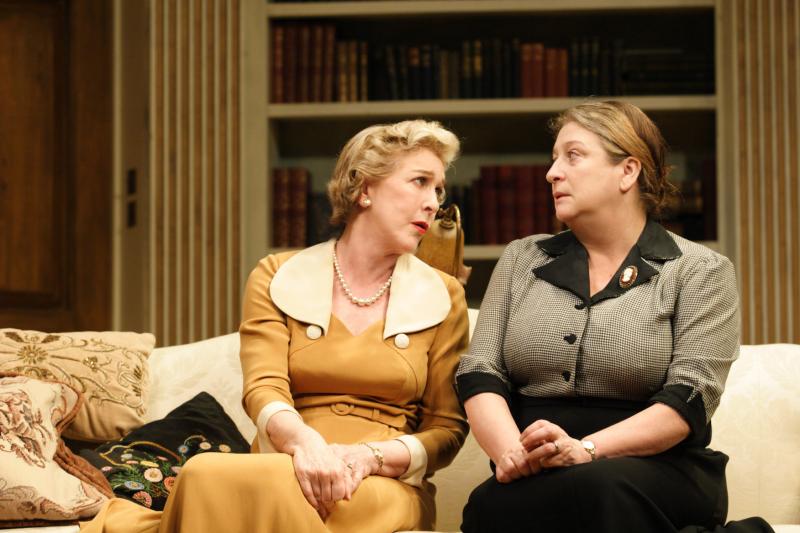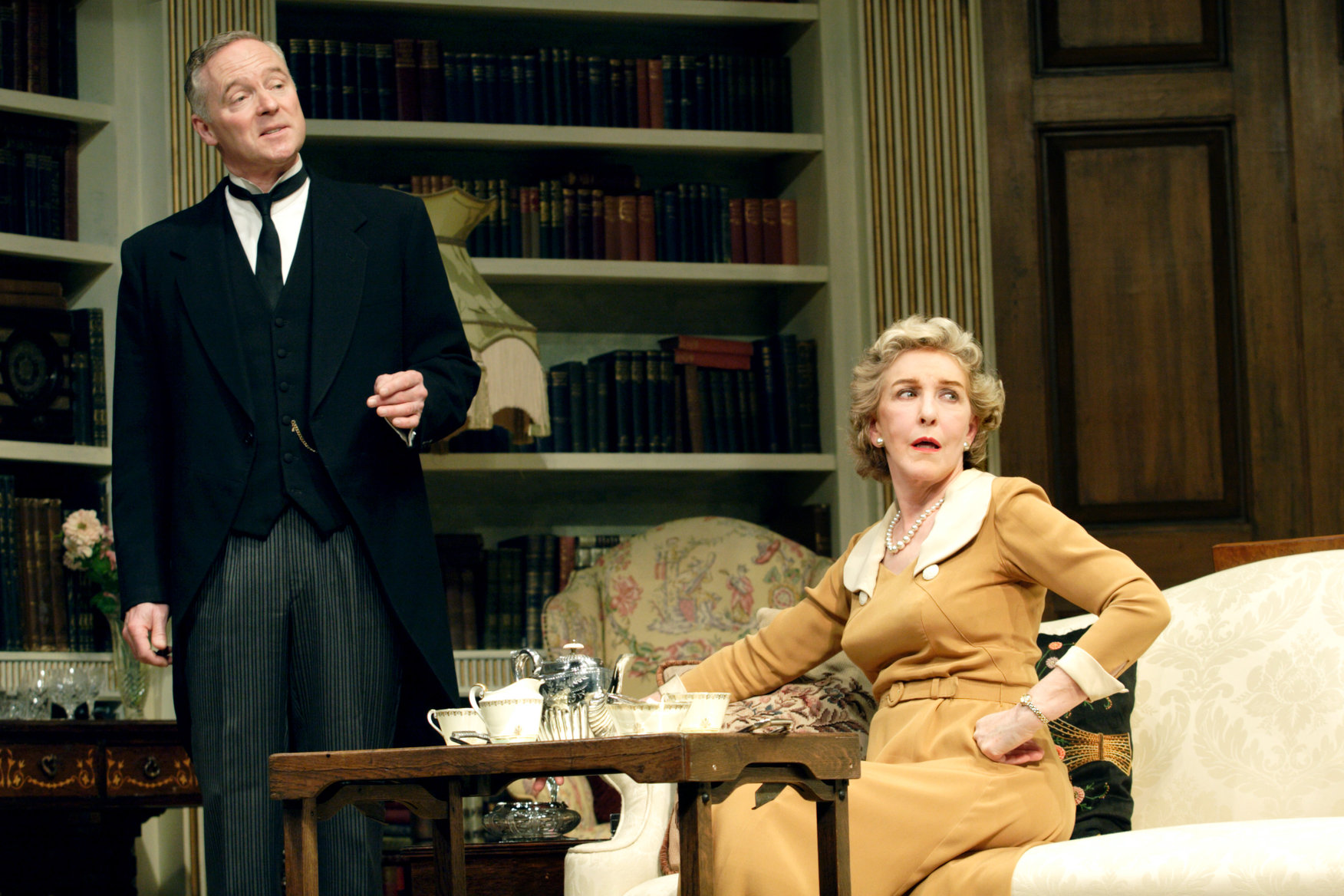Relative Values, Harold Pinter Theatre | reviews, news & interviews
Relative Values, Harold Pinter Theatre
Relative Values, Harold Pinter Theatre
Trevor Nunn is back on form in a straight production that lets Coward's play do the talking

Plotted on the Nunn Curve of Fatal Attraction to Flare Path, Sir Trevor’s latest West End outing – Noël Coward’s post-war comedy Relative Values – lands solidly in the upper-middle reaches. Why not the unqualified upper? The stock answer here would be that Coward’s play is fatally flawed, blighting even a director at his best. Any alternative risks straying into the stickiest of ideological mires, braving the final social and theatrical taboo: class.
“Comedies of manners swiftly become obsolete when there are no longer any manners,” proclaims Wodehouse-esque butler Crestwell in Act II. Coward is never more uncomfortably truthful than when he’s being self-referential, and Relative Values is no exception. Gone are the slick wars-of-words of the plays of the 1930s and '40s. It’s 1951, and in a post-war world where manners have still only recently begun to rival munitions in the national consciousness, Coward’s signature comedy feels ill at ease. It struggles to find a place for itself in post-war drama, just as his characters struggle to find theirs in post-war society.
It’s as though Coward wants us to see the cracks, the fissures in a drama that knows itself to be outmoded
The result is certainly awkward at times. Closing lines land with a thud rather than the champagne cork pop of Private Lives or Design for Living, and the plot is bone-china thin. But the effect is curious. It’s as though Coward wants us to see the cracks, the fissures in a drama that knows itself to be outmoded. And far from leaving the cracks empty he fills them with an unusual degree of anxiety and even pathos.
Set in the usual country house drawing room (meticulously and beautifully designed by Stephen Brimson Lewis), the action plays out over a single weekend. The Countess of Marshwood (Patricia Hodge) discovers her son and heir is to marry a Hollywood actress (Leigh Zimmerman, taking a break from musical theatre). When her maid Moxie (Caroline Quentin) seems disproportionately distressed, it is revealed that Moxie is in fact the actress’s own (younger) sister. Cue paroxysms, convulsions and an elaborate disguise. All of which fails to forestall the ensuing clash of classes and cultures.
 Nunn intercuts Coward’s action with episodes of Pathé newsreel, framing this drawing-room world in the broader context of the Korean War, and this classical mansion with the upstart architecture of the Royal Festival Hall. The implications are clear, and perhaps we don’t need the rather clumsy blast of Vaughan Williams’s Fantasia on a Theme of Thomas Tallis as the curtain rises, reminding us that this is a fading idyll.
Nunn intercuts Coward’s action with episodes of Pathé newsreel, framing this drawing-room world in the broader context of the Korean War, and this classical mansion with the upstart architecture of the Royal Festival Hall. The implications are clear, and perhaps we don’t need the rather clumsy blast of Vaughan Williams’s Fantasia on a Theme of Thomas Tallis as the curtain rises, reminding us that this is a fading idyll.
We also don’t need quite so much first half. Judicious cuts throughout could have tightened the action no end, and reinforced its rather top-heavy dramatic design. But it’s one that the cast still manage to carry off with style. Quentin’s Moxie offers the naturalism (at least initially) to balance Hodge’s deliciously stylised camp, while theatre first-timer Rory Bremner’s Crestwell (pictured above with Hodge) swings repeatedly between the two. What could easily become just a vehicle for Hodge’s brilliance reinvents itself as a true ensemble piece, and even Steven Pacey (in the thankless role of the Countess’s nephew) stakes his claim.
Among so many slick performances however, the real interest still lies with the play itself. The natural instinct is to decry its snobbery and self-satisfied social assumptions, its patronising attitude towards America and frankly baffling prejudices. But what’s striking here are not the anachronisms but rather the lack of them. Every newspaper may currently be filled with hagiographic pictures of the royal tour of Australia, but only a few years ago columns were filled with acerbic commentary on the arriviste Middletons and especially “doors to manual” matriarch Carole, inserting herself into a society in which she didn’t belong.
If we’re uncomfortable watching Coward’s play, that doesn’t necessarily make it flawed – in fact, quite the contrary. Relative Values tackles a topic no one wants to talk about in Call Me Dave’s classless society. Forget sex, religion and politics, this is the real dirt – our own unacknowledged but not uncontested 38th parallel. Nunn’s production lets the play speak for itself, infelicities and all, and the result is as unsettling as it is funny.
- Relative Values at the Harold Pinter Theatre until 21 June
rating
Share this article
The future of Arts Journalism
You can stop theartsdesk.com closing!
We urgently need financing to survive. Our fundraising drive has thus far raised £49,000 but we need to reach £100,000 or we will be forced to close. Please contribute here: https://gofund.me/c3f6033d
And if you can forward this information to anyone who might assist, we’d be grateful.

Subscribe to theartsdesk.com
Thank you for continuing to read our work on theartsdesk.com. For unlimited access to every article in its entirety, including our archive of more than 15,000 pieces, we're asking for £5 per month or £40 per year. We feel it's a very good deal, and hope you do too.
To take a subscription now simply click here.
And if you're looking for that extra gift for a friend or family member, why not treat them to a theartsdesk.com gift subscription?
more Theatre
 Macbeth, RSC, Stratford review - Glaswegian gangs and ghoulies prove gripping
Sam Heughan's Macbeth cannot quite find a home in a mobster pub
Macbeth, RSC, Stratford review - Glaswegian gangs and ghoulies prove gripping
Sam Heughan's Macbeth cannot quite find a home in a mobster pub
 The Line of Beauty, Almeida Theatre review - the 80s revisited in theatrically ravishing form
Alan Hollinghurst novel is cunningly filleted, very finely acted
The Line of Beauty, Almeida Theatre review - the 80s revisited in theatrically ravishing form
Alan Hollinghurst novel is cunningly filleted, very finely acted
 Wendy & Peter Pan, Barbican Theatre review - mixed bag of panto and comic play, turned up to 11
The RSC adaptation is aimed at children, though all will thrill to its spectacle
Wendy & Peter Pan, Barbican Theatre review - mixed bag of panto and comic play, turned up to 11
The RSC adaptation is aimed at children, though all will thrill to its spectacle
 Hedda, Orange Tree Theatre review - a monument reimagined, perhaps even improved
Scandinavian masterpiece transplanted into a London reeling from the ravages of war
Hedda, Orange Tree Theatre review - a monument reimagined, perhaps even improved
Scandinavian masterpiece transplanted into a London reeling from the ravages of war
 The Assembled Parties, Hampstead review - a rarity, a well-made play delivered straight
Witty but poignant tribute to the strength of family ties as all around disintegrates
The Assembled Parties, Hampstead review - a rarity, a well-made play delivered straight
Witty but poignant tribute to the strength of family ties as all around disintegrates
 Mary Page Marlowe, Old Vic review - a starry portrait of a splintered life
Tracy Letts's Off Broadway play makes a shimmeringly powerful London debut
Mary Page Marlowe, Old Vic review - a starry portrait of a splintered life
Tracy Letts's Off Broadway play makes a shimmeringly powerful London debut
 Little Brother, Soho Theatre review - light, bright but emotionally true
This Verity Bargate Award-winning dramedy is entertaining as well as thought provoking
Little Brother, Soho Theatre review - light, bright but emotionally true
This Verity Bargate Award-winning dramedy is entertaining as well as thought provoking
 The Unbelievers, Royal Court Theatre - grimly compelling, powerfully performed
Nick Payne's new play is amongst his best
The Unbelievers, Royal Court Theatre - grimly compelling, powerfully performed
Nick Payne's new play is amongst his best
 The Maids, Donmar Warehouse review - vibrant cast lost in a spectacular-looking fever dream
Kip Williams revises Genet, with little gained in the update except eye-popping visuals
The Maids, Donmar Warehouse review - vibrant cast lost in a spectacular-looking fever dream
Kip Williams revises Genet, with little gained in the update except eye-popping visuals
 Ragdoll, Jermyn Street Theatre review - compelling and emotionally truthful
Katherine Moar returns with a Patty Hearst-inspired follow up to her debut hit 'Farm Hall'
Ragdoll, Jermyn Street Theatre review - compelling and emotionally truthful
Katherine Moar returns with a Patty Hearst-inspired follow up to her debut hit 'Farm Hall'
 Troilus and Cressida, Globe Theatre review - a 'problem play' with added problems
Raucous and carnivalesque, but also ugly and incomprehensible
Troilus and Cressida, Globe Theatre review - a 'problem play' with added problems
Raucous and carnivalesque, but also ugly and incomprehensible
 Clarkston, Trafalgar Theatre review - two lads on a road to nowhere
Netflix star, Joe Locke, is the selling point of a production that needs one
Clarkston, Trafalgar Theatre review - two lads on a road to nowhere
Netflix star, Joe Locke, is the selling point of a production that needs one

Add comment